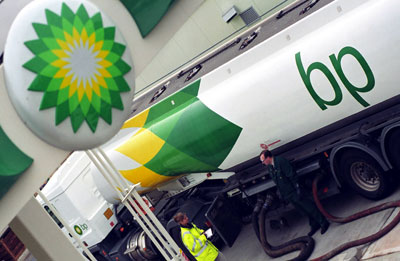
BP close to deal on Iraq output target
Baghdad, December 15, 2012
Oil major BP is close to reaching a deal with Iraq to cut the final production target for the supergiant Rumaila oilfield to between 1.8 million and 2.2 million barrels per day (bpd), oil ministry and industry sources said.
Officials from BP, Iraq's state-run South Oil Company (SOC) and its oil ministry have been in talks for the past four months, studying BP proposals to lower the target of 2.85 million bpd, which they agreed to in 2009.
The negotiations are the latest sign of trouble in Iraq's southern oilfields, where logistical bottlenecks and weak infrastructure have eroded investor interest at the same time that the autonomous Kurdistan region in the north attracts oil majors.
Soon after signing multi-billion service contracts with foreign oil majors, Iraq had said it aimed for an overall production capacity of 12 million bpd, but the Opec member has reduced that target to 8.5-9 million bpd.
"BP has submitted three figures to lower Rumaila production. Iraq has initially accepted to cut output, and a final deal is expected by year-end," a senior SOC official who is involved in the discussions said.
"BP's offer included cutting Rumaila production to 1.8 million barrels per day and extending this final plateau until 2029," the official added.
The final plateau period is the time during which peak production is sustained after it is first reached in 2017.
"We aim to discuss and agree a full field development plan in 2013. Any discussions we have with the government are commercially confidential," a BP spokesman said in response to a request for details.
Rumaila, the workhorse of Iraq's oil industry which BP operates with China's CNPC, has estimated reserves of 17 billion barrels and currently produces around 1.35 million bpd - more than a third of Iraq's total output of 3.4 million bpd.
But crumbling infrastructure, red tape and a lack of clear oil legislation have stunted investor interest and made it difficult for Iraq to achieve its ambitious production plans.
Royal Dutch Shell in March also started talks with Iraq to slash its production target at Majnoon oilfield, the first company to begin negotiations with the government to reduce unrealistic output goals.
"We have to re-negotiate the final production target not only with BP or Shell, but with other companies also," an oil ministry official said. "We don't have suitable infrastructure to deal with future mega production."
A lower target suits Baghdad, officials say, because the government worries that adhering to existing agreements will result in large volumes of unused capacity and deplete more than half of its proven reserves over the life of the 20-year agreements.
Cash is also a concern for the government, which had estimated an investment of some $180 billion would be needed to finance its original countrywide production targets.
"Out of BP's three figures, the 1.8 and 2 million barrels per day have found their way onto the discussion table. We are weighing all economic and technical aspects and will decide on a single figure at the end of this month," said another oil official who helped draft the Rumaila service contract.
Iraqi officials said the Rumaila oilfield had shown significant signs of fast-track production growth but also of a lack of adequate oil pipelines, storage and crude production facilities and that accepting the BP proposals made a target reduction necessary.
Production from Rumaila is expected to hit 1.450 million barrels per day in 2013 from 1.350 million bpd now. For 2013, a development program has been set to drill new 110 oil wells, including injection wells to help sustain production, an oil industry source close to Rumaila activities said.
While negotiating to cut production targets for its southern oilfields, Baghdad has seen majors including Exxon and Chevron sign deals with the Kurdistan Regional Government in the north. Those agreements have increased tensions with the central government over control of Iraq's oil reserves.
Exxon has told the Iraqi central government that it wants to pull out of a $50 billion oil project in the south, while it focuses on exploration deals with the Kurdish region.-Reuters







